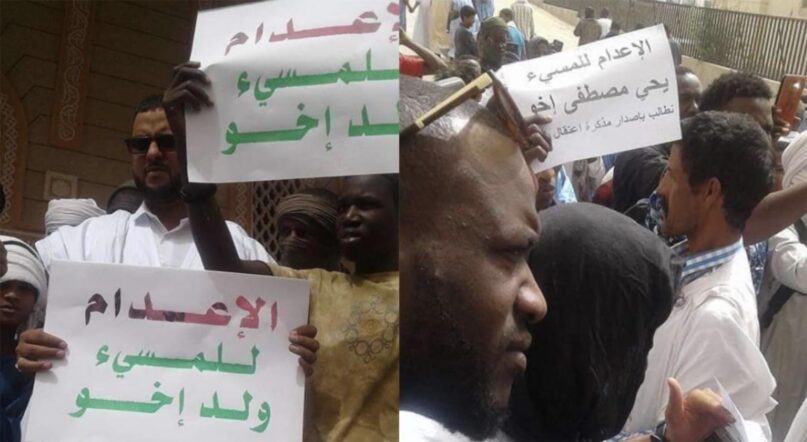COLOGNE, Germany (RNS) — Posing a question on Facebook nearly cost Yahya Ekhou his life.
If God is real, he wondered, why would he allow tragedy to befall his believers?
Ekhou is from Mauritania, an Islamic republic in northwest Africa that designates Islam as the sole religion of the people and the state, meaning non-Muslims have neither rights nor citizenship. Mauritania also has among the strictest blasphemy and apostasy laws in the world, defining them as crimes punishable by death.
Ekhou was living in Germany in early 2019 and had already made plans to stay when a train disaster prompted him to post his question online. The next morning, he woke up to an onslaught of hate directed toward him. Mauritanians, including a representative of Parliament, demanded he be killed. The religious authorities issued a fatwa also calling for his death. Ekhou’s citizenship was revoked, and the country demanded that Germany extradite him so he could face charges for his apostasy.
Shortly afterward, his application for asylum in Germany was rejected.
He eventually found refuge in Germany with the help of Atheist Refugee Relief, a nongovernmental organization headquartered in Cologne.
Founded in 2017 by Rana Ahmad, an atheist refugee herself, from Saudi Arabia, the organization connects religious refugees with immigration lawyers and assists them with filling out government documents. The group also raises funds for refugees’ legal fees and transportation to and from necessary appointments to gain citizenship.
While there are many refugee aid groups in Germany, which hosts more refugees than all but two other countries, no other German group provides support to people who are refugees specifically due to their atheist status.
“What we do is too important because no one else does it,” said Ekhou, who is now on the board of the organization. “There’s many German organizations that support refugees, but when you say ‘I’m an atheist’ or ‘I’m an ex-Muslim’ they don’t want to support you.”
As a child, Ekhou never questioned his faith — in Mauritania, television stations are owned by the state, and non-Islamic publications are strictly regulated. When he started attending university in Cairo, everything changed.
“I had the opportunity to meet other people at university. People with different ethnicities, different religions, different beliefs,” Ekhou said. “That was so important, because I had learned that people who had different beliefs were bad people.”
Along with meeting non-Muslims at school, Ekhou read books that challenged Sunni Muslim beliefs and tenets — books considered radical in Mauritania. As his worldview shifted, he felt compelled to become an activist.
While at school, Ekhou founded the Liberals Network of Mauritania, a group of Mauritanians living outside the country who advocate for the rights of minorities. They fight for freedom of religion, especially the rights of those who have left Islam, and also demand rights for LGBTQ+ people.
“I was born twice,” Ekhou said. “I was born again in Cairo.”
It was there that Ekhou began questioning Islam. He kept his doubts private, out of fear of retribution, and kept his advocacy with the Liberals Network limited to the values of free expression and religious choice. That was enough, however, to make Ekhou the victim of both physical and online harassment.

Protests in Mauritania calling for Yahya Ekhou’s death. (Photo courtesy of Atheist Refugee Relief)
When the harassment escalated to death threats, Ekhou knew he would no longer be safe returning to his home country. After traveling to a United Nations conference in Bonn, he decided to stay in Germany and seek asylum status.
Shortly after he settled in Germany, the train crash took the lives of dozens in Cairo. Ekhou could not wrap his head around the tragedy and the mental images of innocent men, women and children succumbing to flames. On Facebook, he made a post asking how a just God could allow a tragedy like this to befall his own believers.
A few days after his post, Ekhou applied for asylum. Most refugees typically wait a year for their case to be heard, but his application was denied a day after it was submitted. After an appeal, an administrative law court overruled the rejection and granted him asylum.
Paul Franke, a fellow board member of Atheist Refugee Relief, said that atheist refugees are a “niche” community, noting that only 1% of those with a Middle Eastern background are reported to have no religious affiliation.
Nevertheless, in 2024, the group assisted 138 atheist refugees, mainly from Pakistan, Syria, Afghanistan and Bangladesh. It’s estimated that 25,000 migrants came to Germany last year.
Franke adds that many of the refugees they serve, like Ekhou, have their asylum applications rejected the first time. In Germany, where the population is nearly 50% secular, politicians and government organizations often struggle to understand the plight of atheist refugees, Franke, said, and some are hesitant to demonstrate support for refugees coming from countries with Islamic backgrounds.
Ekhou and Franke shared a story of a member of the Bundestag, the German parliament, who privately expressed support for their organization but would not voice it publicly. “Most German politicians don’t understand the situation,” Ekhou said. “They don’t understand how dangerous it is.”
In recent years, Germany has seen an increase in hateful rhetoric regarding refugees and immigrants. The Alternative for Deutschland, a far-right party that came in second during Germany’s national elections in February, advocates for the “remigration” of migrants, including those with German citizenship, to their countries of origin.
A slew of migrant terrorist attacks have inflamed anti-refugee and anti-immigrant rhetoric in Germany as well, with atheist refugees the victims of the ire. Though they no longer consider themselves a part of the Islamic faith, many are perceived to have connections with Islamic extremists because of their dress, language or the color of their skin.
“There are atheist refugees of ours that are like, ‘I know these people are bad, but they also persecute me. Why are you angry at me? I also fled this country,’” said Franke.
Strangely, said Franke, increased Islamophobia may also bring atheist refugees some sympathy, by showing that the refugees need protection from Muslim hard-liners in their countries.
Despite leaving the faith, Ekhou maintains he is not against Islam. Rather, he is pro-religious freedom and the right for every person to choose whether to follow an organized religion.
“I’m not against the Muslim community. I’m fighting against a group from the Muslim community that wants to use violence against us,” Ekhou said. “It’s important to show your identity. You have the right to say, ‘I’m Muslim, I’m proud of my identity.’ I also have the same right to say, ‘I’m an atheist, I’m proud of my identity.’



